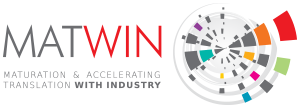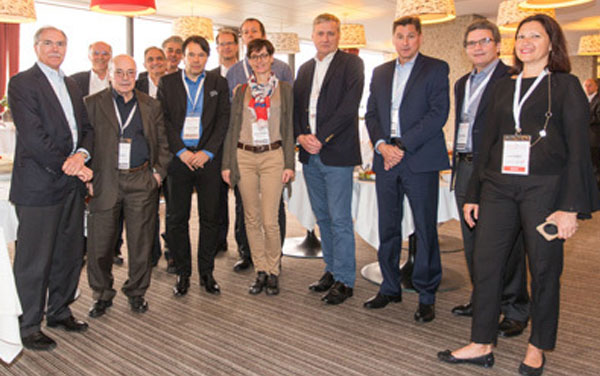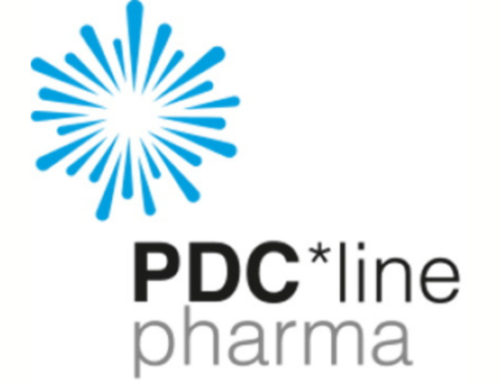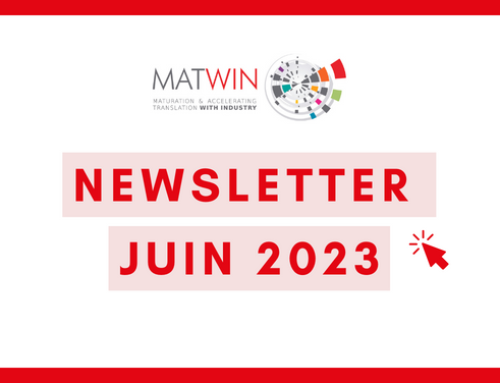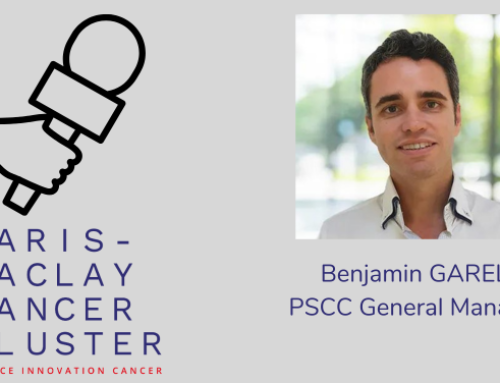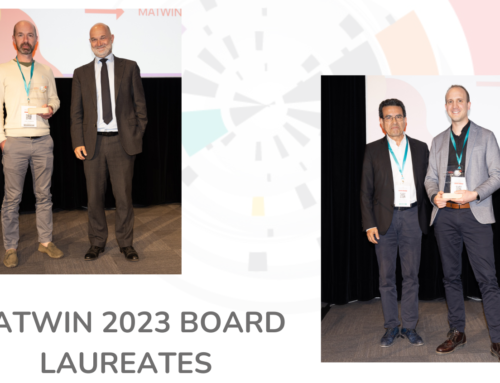Next to MEET2WIN convention was organised the 7th MATWIN International Board meeting in Bordeaux on last May 12th and 13th. Board members have heard the best projects identified through the MATWIN selection process.
7 project leaders have been interviewed during 2 days by a host of well-known leading personalities, academic opinion leaders and representatives from the 12 international pharmaceutical companies’ program partners.
7 project leaders have been interviewed during 2 days by a host of well-known leading personalities, academic opinion leaders and representatives from the 12 international pharmaceutical companies’ program partners.
Discussions with the projects leaders and recommendations offered once more a great added value to the 7 interviewed projects, optimising their development potential.
Industrial partners already declared an interest on 2 projects among the 7 interviewed and some discussions are underway with the relevant technology transfer offices
Abstracts of the 7 projects interviewed by the MATWIN Board in 2016 :
- Therapeutic inhibition of GRASP55/JAM‐C pathway in Acute Myeloid Leukemia through protein/proteininteraction inhibition (2P2I) – Michel Aurrand-Lions – Cancer Research center of Marseille
Despite improvements in patient care thanks to molecular stratification and personalized medicine, Acute Myeloid Leukemia (AML) remains a poor prognosis disease due to elevated number of relapses against which drugs are missing. Relapses are due to re-emergence of full blown leukemia starting from rare leukemic cells that are resistant to first line treatment. Such cells are called Leukemic Stem Cells (LSC). The discovery of molecular pathways specifically active in LSCs has allowed identification of compounds that inhibit LSC survival and growth. One such compound, discovered by our team, is equally active in bulk leukemic cells and LSCs. The main objective of this project is to build on our know-how acquired with this compound in order to develop first in class drugs targeting LSC compartment for AML treatment.
- Human monocytes-derived suppressive cells: new cell therapy against GvHD – Bernard Bonnotte – INSERM U1098, Regional University Hospital Center of Dijon
The induction and maintenance of immune tolerance represent major therapeutic goals in autoimmunity and transplantation and lethal graft-versus-host disease. Increase in the immunity knowledge may help to the development of targeted approaches. We have developed an original approach to generate a subpopulation of human suppressor cells of monocytic origin, called HuMoSC (human monocyte-derived suppressive cells). HuMoSC inhibit the proliferation and activation of both autologous and allogeneic effector CD4+ and CD8+ T lymphocytes and reduce GvHD symptoms, resulting in prolonged animal survival.
- Aptamers to MMP-9 for imaging and targeting tumors – Marine FAUSSILLON-LAVILLE – Novaptech, Bordeaux
NOVAPTECH is expert in the development of aptamers. Aptamers are molecules that can bind specifically to any compound and might serve as diagnostic tool or therapeutic agent. Aptamers are validated alternatives to monoclonal antibodies showing non-equivalent benefits notably with respect to handling, production and cost.
With more than 20 years of experience, NOVAPTECH offers services for the design and characterization of aptamers against any target of interest.
With more than 20 years of experience, NOVAPTECH offers services for the design and characterization of aptamers against any target of interest.
- Identification of oncogenes-targeting microRNAs for liver cancer therapy – Christophe GROSSET – INSERM, Bordeaux
Hepatocellular carcinoma (HCC) is a frequent and deadly cancer which kills around 800,000 people per year in the world. For patients with an advanced liver tumor (60% of the cases), there is currently no curative treatment. MicroRNA-replacement therapy is a new multi-target approach for the treatment of patients with cancer. We identified a microRNA, named miR-K1, which acts as a strong tumor suppressor in liver and targets many oncogenes in tumoral hepatic cells. Our project aims at developing miR-K1-replacement therapy using various routes of administration and at testing miR-K1 in clinic, in combination or not with standard drugs, for the treatment of patients with advanced liver cancer.
- ERK inhibitors for the treatment of RAF and RAS mutated cancers – Jean-François GUICHOU – AGV Discovery / CNRS, Montpellier
AGV Discovery and its academic partner, INSERM, have identified an original series of small molecules that selectively inhibit ERK kinase activity by using a Fragment-Based approach. In vitro studies revealed promising anti-proliferative activity of the lead compound on RAF and RAS driven cell lines (better than ERK inhibitors currently in clinical trials), with a higher in vitro therapeutic index than competitors. An in vivo proof of concept was also obtained in a melanoma xenograft model with no apparent toxicity. Moreover, lead shows good ADMET profile and represents promising drug candidates for the treatment of RAF and RAS mutated cancers as single agent or in combination with other therapies (immuno / chemo / targeted therapies).
AGV Discovery is now looking either for a pharmaceutical company to acquire and pursue its ERK inhibitors program by the end of 2016, or for a fundraising to achieve regulatory preclinical development and to launch clinical phases.
AGV Discovery is now looking either for a pharmaceutical company to acquire and pursue its ERK inhibitors program by the end of 2016, or for a fundraising to achieve regulatory preclinical development and to launch clinical phases.
- Define assays for precision medicine in haematological malignancies – Jérôme MOREAUX – DIAG2TEC / Montpellier Functional Genomics Institute
Diag2Tec is an expert company devoted to hematological cancers, especially to Multiple Myeloma (MM). Diag2Tec offers to pharmaceutical and biotechnology companies in vitro assessment of drug efficiency, characterization of mechanisms of action and identification of biomarkers allowing drug response prediction. Diag2Tec offers to oncologists tools to improve diagnosis and treatment strategies related to precision medicine in hematological malignancies.
Thanks to different expertises, R&D relationships and innovative tools, Diag2Tec has developed biomarkers predicting tumor cell response to different molecules in hematological cancers.
Today Diag2Tec needs to progress in clinical validation of these biomarkers. For this reason, Diag2Tec needs strong support from MATWIN and its partners.
Thanks to different expertises, R&D relationships and innovative tools, Diag2Tec has developed biomarkers predicting tumor cell response to different molecules in hematological cancers.
Today Diag2Tec needs to progress in clinical validation of these biomarkers. For this reason, Diag2Tec needs strong support from MATWIN and its partners.
- Theranostic of non-hodgkin B lymphomas – Jean-Ehrland Ricci – Mediterranean Molecular Research Centre – INSERM, Nice
The incorporation of anti-CD20 (rituximab) coupled with chemotherapy in the management of non-Hodgkin lymphoma has largely improved the response rate and overall survival of patients. However, 30-40% of treated diffuse large B cell lymphoma (DLBCL) patients are refractory or will relapse. We have identified a prognostic factor that allows 1/ an easy identification of non-responding patients from the diagnosis and 2/ to offer them new therapeutic options.
